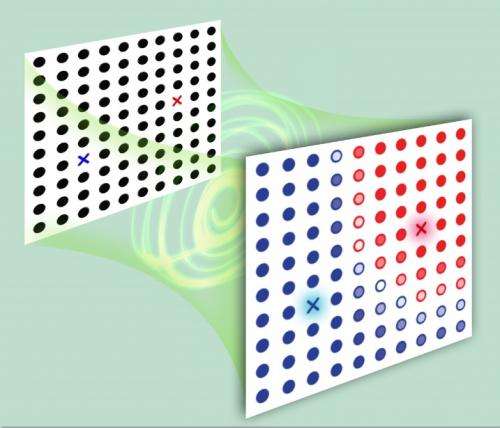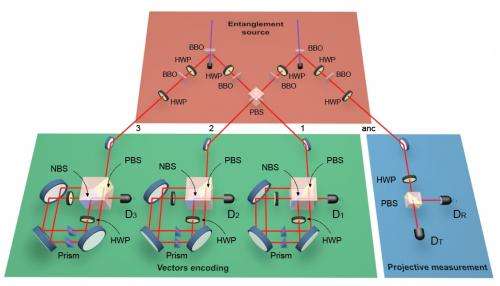March 30, 2015 feature
Quantum computers could greatly accelerate machine learning

(Phys.org)—For the first time, physicists have performed machine learning on a photonic quantum computer, demonstrating that quantum computers may be able to exponentially speed up the rate at which certain machine learning tasks are performed—in some cases, reducing the time from hundreds of thousands of years to mere seconds. The new method takes advantage of quantum entanglement, in which two or more objects are so strongly related that paradoxical effects often arise since a measurement on one object instantaneously affects the other. Here, quantum entanglement provides a very fast way to classify vectors into one of two categories, a task that is at the core of machine learning.
The physicists, Chao-Yang Lu, Nai-Le Liu, Li Li and colleagues at the University of Science and Technology of China in Hefei, have published a paper on the entanglement-based machine learning method in a recent issue of Physical Review Letters.
As the researchers explain, machine learning has many different uses in everyday life. One example is a spam filter that sorts email into spam and nonspam messages by comparing the incoming email with old email labeled by the user. This is an example of supervised machine learning, as the system is provided with a set of examples. In unsupervised machine learning, the system does not receive prior information. An example of unsupervised machine learning is photo editing software that attempts to classify pixels into two groups: the object and the background.
For both supervised and unsupervised machine learning, the new items to be classified (e.g., emails, pixels, etc.) are represented by vectors. The system assigns each vector to one of two categories by analyzing the vector's length and comparing it to a reference vector in each category. The new vector is assigned to the category containing the most similar reference vector.
Classifying a small number of vectors in this way can be done very quickly. However, as the amount of data in the world rapidly increases, so does the time required for machines to process it. Researchers expect that this "big data" problem could one day pose a challenge even for the fastest supercomputers.

In the new paper, the physicists addressed this challenge by representing vectors with quantum states, and then entangling the states before comparing the distance between them. As they explain, quantum computers are naturally good at manipulating vectors. So to do this, they used a small-scale quantum computer that manipulates optical qubits, or photons.
In the optical setup, one photon acts as an ancillary qubit, and is used to entangle another photon that encodes both the reference vector and the new vector. The resulting two-photon entangled state is used to classify two-dimensional vectors, whereas three- and four-photon entangled states can classify four- and eight-dimensional vectors, respectively. In general, different vector dimensions are needed to describe the properties of different real-world objects.
As the scientists explained, the quantum method can potentially accelerate machine learning far beyond what today's computers are capable of. Lu gave an example to illustrate just how powerful the exponential speed-up is:
"To calculate the distance between two large vectors with a dimension of 1021 (or, in the language of Big Data, we can call it 1 Zettabyte (ZB)), a GHz clock-rate classical computer will take about hundreds of thousands of years," Lu told Phys.org. "A GHz clock-rate quantum computer, if we can build it in the future, with the exponential speed-up, will take only about a second to estimate the distance between these two vectors after they are entangled with the ancillary qubit."
This quantum-based vector classification method can be used for both supervised and unsupervised machine learning, and so could have a wide variety of applications. Machine learning is used in fields such as computer science, financial analysis, robotics, and bioinformatics. It's also ubiquitous in our daily lives, such as in face recognition, email filtering, and recommendation systems for online shopping.
"Machine learning has been all around, and will likely play a more important role in the age of Big Data with the explosion of electronic data," Lu said. "It is estimated that every year it grows exponentially by 40%. On the other hand, we have bad news about Moore's law: If it is to continue, then in about 2020, the chip size will shrink down to the atomic level where quantum mechanics rules. Thus, the speed-up of classical computation power faces a major challenge. Today, we may still be good running machine learning and other computational tasks with our good old classical computers, but we might need to think of other ways in the long run."
In the future, the researchers hope to scale the method to larger numbers of qubits. They explain that higher-dimensional quantum states can be encoded using a photon's degree of freedom of orbital angular momentum, or by using other properties.
"We are working on controlling an increasingly large number of quantum bits for more powerful quantum machine learning," Lu said. "By controlling multiple degrees of freedom of a single photon, we aim to generate 6-photon, 18-qubit entanglement in the near future. Using semiconductor quantum dots, we are trying to build a solid-state platform for approximately 20-photon entanglement in about five years. With the enhanced ability in quantum control, we will perform more complicated quantum artificial intelligence tasks."
More information:
X.-D. Cai, et al. "Entanglement-Based Machine Learning on a Quantum Computer." Physical Review Letters. DOI: 10.1103/PhysRevLett.114.110504
Also at arXiv:1409.7770 [quant-ph]
Journal information: Physical Review Letters
© 2015 Phys.org














.jpg)





